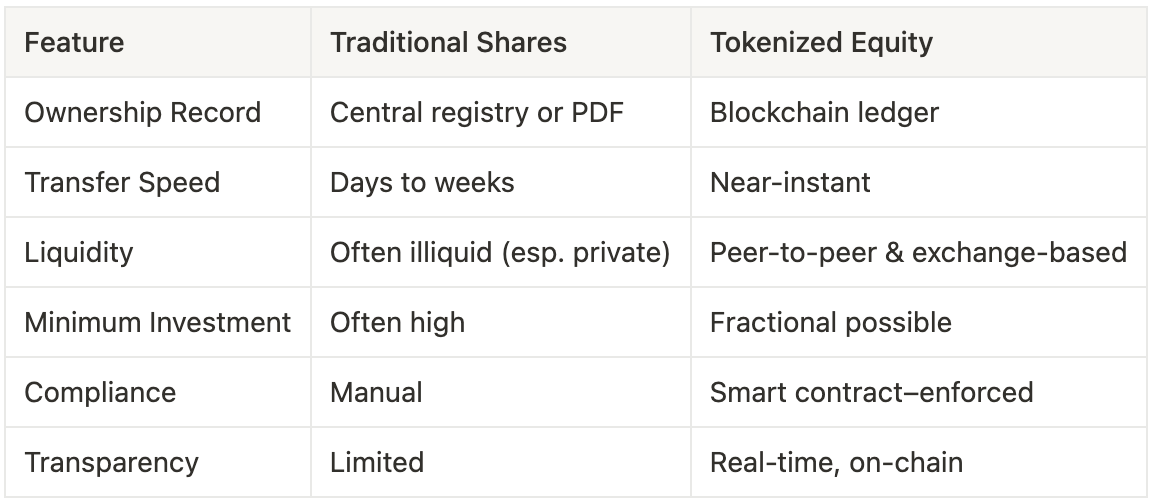Tokenized Equity Explained: Digitizing Company Shares
Imagine buying shares of a company with the click of a button. No paperwork, no middlemen, no borders. That’s the promise of tokenized equity: a faster, more accessible, and more transparent way to invest in companies using blockchain technology.
As equity markets evolve, digital shares are emerging as the next frontier. From startups raising capital more efficiently to investors enjoying fractional ownership and 24/7 trading, equity tokenization is unlocking powerful new opportunities in how company ownership is managed and transferred.
In this article, we’ll walk you through what tokenized equity is, how it works, why it matters, and what the future of equity markets might look like.
What Is Tokenized Equity?
Tokenized equity refers to the digital representation of company shares on a blockchain. Instead of recording ownership in a paper registry or centralized database, each share is issued as a digital token, a cryptographic asset that lives on-chain.
These digital securities function just like traditional shares: they represent ownership in a company and often come with rights like voting, dividends, or profit-sharing. But unlike traditional shares, they benefit from the efficiency and programmability of blockchain infrastructure.
In simple terms: tokenized equity = company shares + blockchain.
How Equity Tokenization Works
The tokenization of company equity typically involves the following steps:
1. Company Structuring
The company must have a legal framework that supports share tokenization. This may involve adopting a digital share registry, shareholder agreement modifications, or working with jurisdictions that recognize blockchain-based securities.
2. Smart Contract Deployment
A smart contract is deployed on a blockchain (e.g., Ethereum, Polygon, or ONINO) to mint digital tokens representing the company’s shares.
3. Investor Onboarding
Investors undergo KYC/AML verification and receive tokens in a compliant manner, often through a tokenization platform or funding portal.
4. Trading and Transfers
Tokenized stocks can be transferred peer-to-peer or on compliant secondary markets, subject to restrictions and smart contract-based compliance rules.
5. Cap Table Automation
Every token transfer automatically updates the cap table (the company’s record of who owns how much), eliminating the need for manual reconciliation.
Why Tokenized Equity Matters
✅ Fractional Ownership
With tokenized equity, companies can divide ownership into smaller units. This allows investors to buy a fraction of a share opening up equity investing to a broader audience.
✅ Enhanced Liquidity
Traditional private shares are notoriously illiquid. By tokenizing equity, companies can allow peer-to-peer transfers or create controlled secondary markets, improving exit opportunities for shareholders.
✅ 24/7 Global Access
Unlike traditional stock markets, tokenized stocks can be traded globally, 24/7 subject to regulatory frameworks and smart contract rules.
✅ Automated Compliance
Smart contracts can enforce transfer restrictions (e.g., only KYC’d investors, country-specific rules, lock-up periods) without relying on manual processes or intermediaries.
✅ Transparent Cap Table Management
With blockchain, the shareholder register is updated in real time. This gives founders, legal teams, and investors full visibility into ownership without spreadsheets or paperwork.
Real-World Examples
🇨🇭 Aktionariat (Switzerland)
Aktionariat enables Swiss companies to tokenize shares directly on Ethereum and sell them from their own websites. Their tools handle smart contract creation, cap table automation, and compliance.
🇩🇪 ONINO (Germany)
Tokenization platform ONINO tokenizes shares in companies, enabling fractional equity ownership in property portfolios for retail investors.
🇺🇸 INX & tZero (USA)
These platforms enable U.S. companies to issue SEC-compliant security tokens, including tokenized stocks that represent equity in private or public firms.
Who Benefits from Tokenized Equity?
- Startups: Raise capital globally, automate investor management, reduce legal costs
- SMEs: Digitize shareholder processes and improve access to alternative financing
- Investors: Access early-stage equity, fractional ownership, and enhanced liquidity
- Developers: Build tokenization infrastructure, investor dashboards, or compliance tools
- Lawyers/Notaries: Automate shareholder agreements, digitalize registry management
Regulatory Considerations
While tokenized equity brings innovation, it also falls under traditional securities laws. Key regulatory points include:
- Prospectus requirements for public offerings
- Private placement exemptions
- KYC/AML checks for all investors
- Securities registration or notification (varies by jurisdiction)
- Custody and settlement rules
In Europe, jurisdictions like Switzerland, Germany, and Luxembourg are actively enabling equity tokenization through updated laws. Working with a compliant platform like ONINO can streamline these processes and reduce regulatory friction.
Tokenized Equity vs. Traditional Shares

What’s Next for Tokenized Equity?
The future of tokenized equity is being shaped by:
- Fully on-chain corporate governance (e.g., shareholder voting via smart contracts)
- Integration with secondary markets for compliant trading
- Cross-border fundraising with real-time cap table updates
- DAO-like investment structures for early-stage equity participation
- Hybrid models combining traditional legal structures with on-chain tokenization
Analysts project that a growing share of private equity and startup financing will move to tokenized formats, bringing access, speed, and automation to global capital markets.
Final Thoughts
Equity tokenization isn’t just a technical upgrade it’s a fundamental rethinking of how company ownership works in the digital age. By turning shares into digital tokens, businesses can access capital more efficiently, investors can engage with companies more flexibly, and developers can build entirely new models for how equity is created and exchanged.
Whether you're a founder seeking global investors, an SME looking to modernize your shareholder structure, or a developer building the next generation of investment tools tokenized equity is the infrastructure of tomorrow’s capital markets.
Interested in tokenizing your company shares or building equity-based investment products?
Book a demo with ONINO and let’s explore your path to digital equity.

.jpg)
